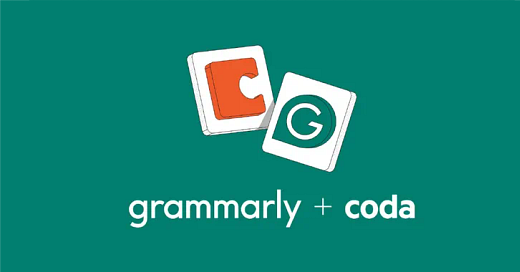Two deals greatly impact the VC market: Grammarly’s acquisition of Coda and Databricks’ series J fundraising.
Two days ago, Grammarly which is valued at $13 billion, announced its acquisition of Coda, a company with a $1.4 billion valuation. This acquisition seems to address the weaknesses of both companies while potentially creating a formidable competitor to Notion in the productivity tools market.
Why This Acquisition Makes Sense for Coda
Coda has struggled to compete effectively with Notion, particularly in the broader B2B market. While Coda’s product is excellent, its ideal customer profile (ICP) is narrow, primarily targeting product and engineering teams of 20-100 people.
However, this limited target audience is only part of the challenge. Two significant issues have hindered Coda’s growth:
B2B Competition: Coda is outmatched by Notion in general collaboration and lacks the scale to challenge tools like Jira or Atlassian in managing larger teams and workflows.
AI’s Impact: Over the next 5-10 years, advancements in AI could dramatically boost productivity, reducing the overall need for collaboration tools. For example, if engineering and design teams become five times more productive, the demand for traditional collaborative solutions may shrink—a challenge similar to what Figma is facing.
These difficulties have made it harder for Coda to secure investor funding. By merging with a complementary tool like Grammarly, Coda gains a stronger market position and the ability to offer bundled solutions.
However, convincing the market of the value of this synergy will require significant effort.
Why Grammarly Gains from This Deal
For Grammarly, this acquisition fills a critical gap in its product portfolio. Grammarly’s core strength lies in grammar and writing assistance, but its capabilities have been somewhat limited in scope.
Notion’s recent integration of AI into its platform has further encroached on Grammarly’s territory. Partnering with Coda gives Grammarly access to collaborative and document management features that were previously missing from its offerings.
Strategically, this acquisition allows Grammarly to strengthen its position in the enterprise market.
Grammarly has already established a strong presence with 96% of Fortune 500 companies, including teams at Atlassian, Zoom, and Databricks.
By integrating Coda’s capabilities, Grammarly can offer deeper solutions for team collaboration and productivity.
Valuation and Market Comparison
Grammarly was last valued at $13 billion, while Coda’s valuation stood at $1.4 billion. Post-acquisition, the combined company’s valuation is expected to exceed $13 billion, surpassing Notion’s $10.3 billion valuation.
From a user perspective, Notion announced in July 2024 that it had surpassed 100 million users, with an estimated 30 million monthly active users. Grammarly, on the other hand, boasts 40 million daily active users and an extensive channel network, integrating with over 500,000 apps and websites.
Financially, Notion’s estimated annual recurring revenue (ARR) is around $300 million, significantly lower than the previously rumored $576 million.
Grammarly, however, has an ARR of at least $275M, while my source said it achieved an ARR of $800 million last year, demonstrating its strong monetization capabilities.
Product Synergies and Future Prospects
The integration of Coda into Grammarly’s ecosystem is a game-changer. Grammarly’s official blog highlights the potential of combining Coda’s “Coda Brain” with its AI solutions to create a unified productivity platform.
Coda Brain enables companies to harness their organizational knowledge and data, offering a context-aware assistant that integrates seamlessly across tools like email, CRM, and project trackers.
In the short term, this partnership aims to:
Enhance Grammarly’s AI Assistant: With Coda’s context-awareness capabilities, Grammarly’s assistant can become smarter and more helpful by connecting to a user’s entire workflow.
Unify Workspaces: Coda documents will remain functional as they are today, but Grammarly’s assistant will integrate seamlessly, enhancing the user experience across both platforms.
Long-term, the goal is ambitious: to merge Grammarly and Coda’s strengths into a cohesive AI-native productivity suite. This suite will combine company knowledge, generative AI chat features, and a complete productivity toolkit to redefine how work gets done in the AI era.
Competitive Landscape
While Notion remains a strong competitor, with adoption in 62% of Fortune 500 companies and significant traction in the tech and AI sectors, Grammarly’s acquisition of Coda positions it to challenge Notion’s dominance.
Notion allows companies to retain knowledge and data within its ecosystem, which has been a key advantage. With Coda, Grammarly can now offer similar capabilities, closing this gap.
Leadership and Vision
As part of the deal, Coda CEO Shishir Mehrotra will take over as Grammarly’s CEO, while Grammarly’s current CEO will transition into an advisory role. This leadership change underscores the value Grammarly places on Coda’s vision and capabilities.
Mehrotra emphasized that both companies share a vision of AI redefining business applications and workflows. Their goal is to create a collaborative environment where humans and AI work together seamlessly.
In my view, this acquisition represents a strategic alignment that could reshape the productivity tools market. While convincing users and businesses of the value of this integration will be challenging, the potential synergies are undeniable.
With Grammarly’s market reach, Coda’s product depth, and a visionary new CEO, this partnership may very well create a strong competitor to Notion—and redefine productivity in the AI era.
Why Databricks did the largest fundraising in VC history?
In the other deal, Databricks raised a record-breaking $10 billion in its Series J investment, surpassing even OpenAI’s $6.6 billion funding. This marks the largest VC funding in history.
The funding was co-led by six firms, including Thrive Capital (which also led OpenAI’s $6.6 billion round), a16z, DST, GIC, Insight, and WCM. This pushed Databricks’ valuation to $62 billion, with a significant portion of the funds used to purchase employee stock, offering liquidity to its workforce.
The Role of a16z and Ben Horowitz
As Databricks’ earliest investor, a16z stands to gain over $10 billion in returns. The firm has been instrumental in the company’s journey. Initially, Databricks sought $200,000 in seed funding, but a16z co-founder Ben Horowitz saw its potential and invested $11 million instead.




